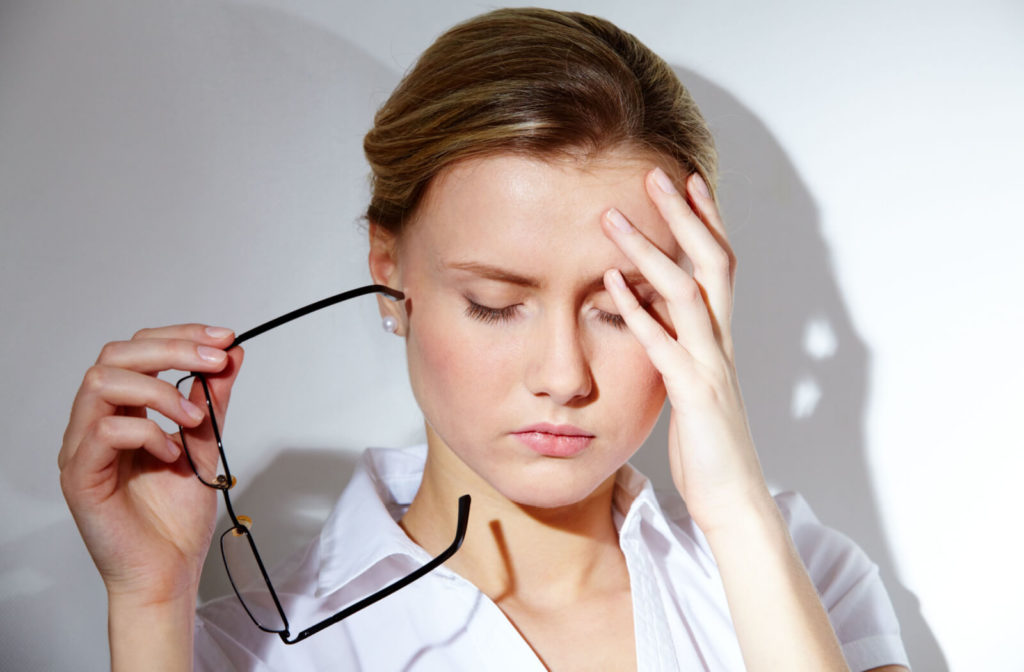Getting your new pair of eyeglasses can be an exciting way to help you achieve clearer vision. However, if your prescription has changed significantly or your frames are poorly-fitted, you may be experiencing some unwanted headaches or discomfort.
Checking to make sure you have the right prescription, taking periodic breaks to let your eyes rest, and having a properly fitted frame are all great methods that may help alleviate headaches.
Get your new frames and lenses by booking an appointment at San Clemente Optometry and speaking with one of our friendly staff.
What Might Be Causing Your Headaches?
There could be varying reasons your new glasses and lenses are causing headaches. Here are some of the potential causes:
Wrong Prescription
It’s unlikely that wearing the wrong prescription lenses will damage your eyes, but they can cause discomfort, like headaches. Wearing the wrong prescription for a prolonged period can cause noticeable eye strain that brings symptoms like a headache.
For example, if your prescription is too weak or strong, your eyes will likely need to work harder to see, and the strain put on your eyes can lead to a headache.
Wrong Size Frame
Poorly-sized frames are another common reason you might be experiencing headaches from your new glasses. For example, glasses frames that are too tight might put pressure behind your ears, leading to headaches.
Adjustment Period
Some discomfort in your eyes and head after getting new glasses can be a common side effect while your eyes are adjusting to new glasses. Your eyes contain multiple muscles that need time to adjust to the new lenses and their impact on your vision.
Multiple power lenses are more likely to cause headaches as your eyes may find it a challenge to get used to looking through the different parts of the lens. For example, if you are both nearsighted and farsighted, the bottom of the lens might be for observing objects up close and the center far away. Your eyes need some time to get accustomed to these changes.

Tips for Preventing Headaches?
Here are a few methods that may help relieve discomfort or reduce the symptoms experienced by wearing new glasses:
Double Check Your Prescription & Frames
Double-checking to make sure your glasses are the right prescription and fit correctly can be a great way to determine what is causing your headaches. If your prescription is too strong or weak, you must speak with your optometrist about making adjustments.
In terms of frames, you want them not to press too tightly against the sides of your head but also not wobbly. One popular test you can try when determining if frames fit your face is to shake your head and see if they fall off. Frames that stay on but don’t fit too snugly are likely the right size.
Take Medication
Over-the-counter medications, like Advil or Tylenol, can help alleviate some of the discomfort you might experience from a headache. Most pharmacies and grocery stores will have some pain medication that can be taken orally. We recommend checking with your doctor before introducing new medications into your body.
Get Bluelight Glasses
If you spend a lot of time looking at a screen during the day, whether for work or enjoyment, investing in blue light glasses or adding them to your new lenses may be a good idea. Blue light is a short energy wave that is emitted from the sun, but also artificially through laptops, computers, and other screens. Wearing blue light glasses can help reduce the impact of this light on your eyes.
Take Breaks
Taking breaks between wearing your glasses is an excellent way of allowing your eyes time to rest. Consider going for a walk, stretching, or another activity you can perform without your glasses to allow your eyes to relax and rest.
Eye Exams
Eye exams provide your doctor with the opportunity to evaluate your ocular health and check for signs of abnormalities or development of any vision conditions.
What Happens at an Eye Exam?
Typically an eye exam will last anywhere from 30 minutes to an hour and may start with some questions regarding your personal health and family health history. Following this, your doctor will likely conduct various tests to evaluate your visual skills.
How Often Should You Get an Eye Exam?
Having regular eye exams is crucial to maintaining good ocular health. Here is the recommended schedule you should follow:
- At least every 2 years over the age of 18
- Once a year past age 65
Your doctor may recommend coming more frequently based on your family’s health history or any pre-existing visual conditions.
Book an Appointment Today
Regular eye exams can help to keep your eye health in check. At San Clemente Optometry, our friendly staff is happy to book you an appointment for your next eye exam with one of our experienced doctors.




